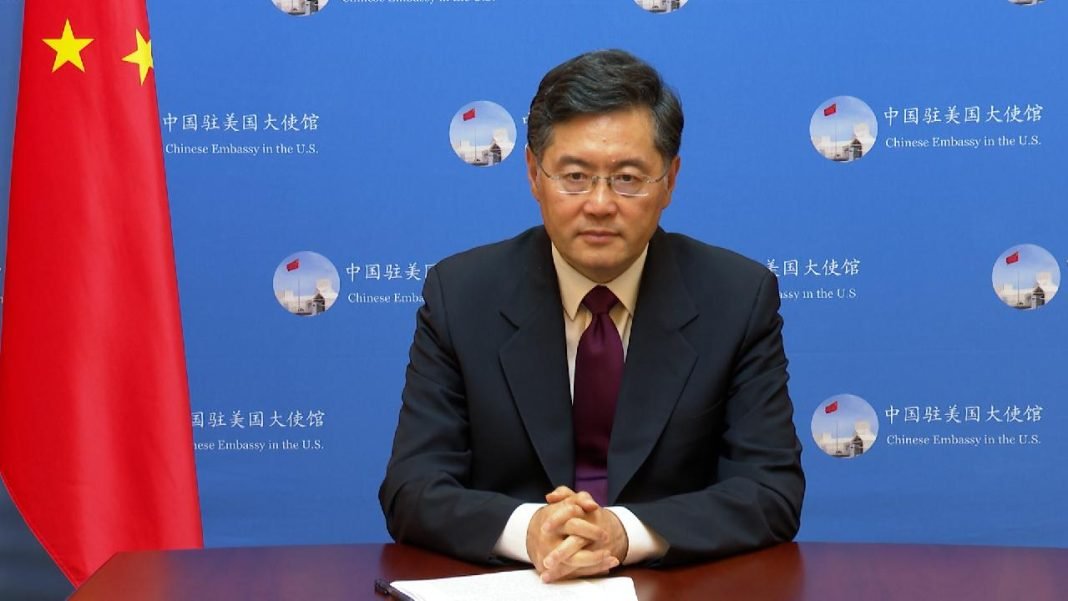New York, 10 August 2022 (TDI): Chinese Ambassador to the US, Qin Gang, on Tuesday delivered remarks at the fourth US-China Business Forum.
Qin Gang discussed China’s efforts to protect intellectual property rights and the influence of the Taiwan issue on China-US cooperation. Qin also discussed China’s commitments to the global struggle against climate change.
China’s efforts to protect intellectual property rights
The Chinese Ambassador said that China respected innovation and intellectual property rights. They are crucial components of the new system of a higher-standard open economy that China is constructing. The Ambassador added that China’s development needs to secure intellectual property.
To strengthen intellectual property rights (IPR) protection, China has established IPR courts in numerous locations. Qin said that strengthening IPR protection is always an ongoing effort that will never stop.
Theme of the 4th China-US Business Forum
The theme of the 4th China-US Business Forum is “New Paths Forward”. The theme is relevant for examining the future of trade and economic ties between China and the US.
Qin Gang said the concept of win-win should be the main component of the “new routes forward.” Cooperation in trade and the economy between China and the US dates back more than 40 years.
The US and China’s economy is quite complementary, and they have intertwined industries. The concept of win-win collaboration has long existed for US and China.
The “new paths forward” for China-U.S. trade and economic relations are primarily motivated by China’s promising economic growth prospects.
China has successfully integrated the COVID response with economic and social development. China also adopted several policy measures to stabilize economic growth. Despite all the challenges, China’s GDP increased by 4.8% in the first quarter of this year and will continue to rise in the second.
The biggest favourable condition for the “new paths forward” is that China can provide the world is its largest market and expand the potential for consumption. China will increase market access for international investors and open up to a higher standard.
Qin Gang said that win-win will remain the most prominent feature of their economic and trade relations.
Also read: China, Pakistan strengthen people-to-people ties
Challenges to China-US bilateral cooperation
There are significant obstacles and uncertainties in the way of China-US economic and trade cooperation. The US uses strategic rivalry to define China-US relations.
The US also views China as the main rival which is a long-term challenge that would only increase tension. This put China and US relations on the path of conflict, and put more strain on economic and trade cooperation.
The Chinese Ambassador said that despite China’s resistance, US House Speaker Nancy Pelosi visited China’s Taiwan region. Moreover, the US openly violates the One-China principle which is a provocative and dangerous move.
It severely undermines peace and stability across the Taiwan Strait and violates China’s has a significant negative impact on China-US ties.
Moreover, China suspended talks with the US on climate change due to Pelosi’s visit to Taiwan. However, China is committed to being an active part of international cooperation on climate change. China also provides assistance to developing states with climate issues.
The US also used the lie of “forced labour” in Xinjiang forcing many Chinese workers to become jobless and hindering US-China interactions on climate change.
China’s Ambassador said China and the US need active action, openness and inclusiveness in their trade relations. China is preparing to collaborate with the US to restore trade and economic bilateral relations and let trade and economy bring happiness to the people of China and the US.
Student of BS International Relations in Kinnaird College for Women. Currently, working in 'TDI' as a contributor.








